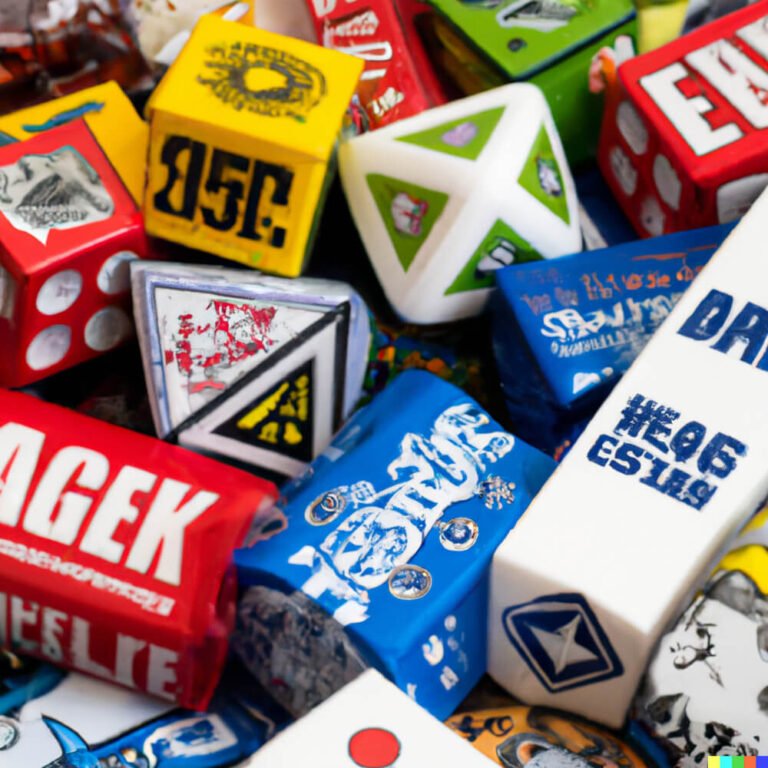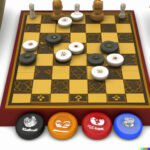Classic board games have always held a special place in the hearts of game enthusiasts, both young and old. From Monopoly to Chess, these timeless gems continue to captivate generations with their nostalgic charm and social bonding aspects. In this article, we will delve into the reasons why classic board games have stood the test of time and explore the enchanting world they offer.
The enduring appeal of classic board games can be attributed to their ability to bring people together. Whether it’s gathering around a table with family or friends, these games provide a unique opportunity for face-to-face interaction and connection.
In an increasingly digital age, where screens dominate our leisure time, the tactile nature of traditional board games offers a much-needed break from technology. The friendly competition and shared laughter that accompany these games create lasting memories and strengthen relationships in ways that virtual experiences cannot.
Furthermore, classic board games evoke a strong sense of nostalgia. Many of us have fond memories of playing these games during childhood, bringing back feelings of warmth and joy. The familiarity of rolling dice, moving tokens across colorful boards, or challenging opponents intellectually is comforting in its simplicity yet endlessly entertaining. It is this combination of nostalgia and timeless gameplay mechanics that continues to draw new generations towards these iconic favorites.
In the following sections, we will take an in-depth look at some beloved classic board games such as Monopoly, Scrabble, Chess, Clue, Risk, Candy Land, and The Settlers of Catan. Through examining their histories, strategies for success, memorable editions or controversies surrounding them – we hope to rekindle your passion for these beloved classics and inspire you to revisit them on your next game night adventure.
Monopoly
Monopoly is undoubtedly one of the most iconic and enduring board games of all time. Introduced in the early 20th century, this classic game has been a household favorite for generations. Its longevity can be attributed to various factors, including its timeless theme, engaging gameplay, and the countless memories it creates. Monopoly continues to captivate players of all ages with its exciting blend of strategy, luck, and negotiation.
One of the reasons for Monopoly’s enduring popularity is its origins and history. The game was originally created by American anti-monopolist Elizabeth Magie in 1903 as “The Landlord’s Game” to demonstrate the economic disparities caused by monopolies. It underwent several changes and adaptations before being acquired by Parker Brothers in 1935 and rebranded as Monopoly. Since then, it has become a global phenomenon, available in numerous editions and translations.
For those looking to become a Monopoly pro, it is essential to familiarize themselves with effective strategies and rules. Building a diverse property portfolio, acquiring key locations like Boardwalk and Park Place, and skillful negotiation are some winning tactics. Learning how to maximize your profits through shrewd investments while managing risks is crucial. Additionally, staying updated on memorable editions such as special anniversary editions or limited collector’s sets adds another layer of excitement for avid players.
However, it is worth mentioning that Monopoly has not been without its share of controversies throughout its history. Over the years, debates about house rules or preferential treatment have sparked heated discussions among players worldwide. These disputes have even resulted in official rulebooks being published to settle disagreements more objectively. Nevertheless, these controversies have only added to the game’s allure and fuelled passionate discussions among fans.
Whether you’re planning a family game night or looking for an engaging activity during gatherings with friends, Monopoly never fails to entertain. Its timeless appeal lies in the opportunity for players to experience the rollercoaster of managing finances, making calculated risks, and striving for victory. So gather your family and friends, prepare to embark on a thrilling money-making adventure, and watch as Monopoly continues to delight players of all ages and generations.
Scrabble
Scrabble, the classic word game that has been captivating players for decades, is a test of vocabulary, strategy, and creativity. With its simple yet addictive gameplay, Scrabble has become a worldwide sensation that continues to engage players of all ages. Whether you’re a seasoned player looking to improve your skills or a beginner eager to dive into the world of wordplay, Scrabble offers endless opportunities for fun and intellectual stimulation.
To excel at Scrabble, it’s essential to expand your vocabulary and discover unusual word combinations. One effective strategy is to familiarize yourself with two-letter words, which can be used strategically to form longer words and maximize points. Additionally, learning useful prefixes and suffixes can greatly enhance your ability to create high-scoring words on the board.
It’s important not only to focus on scoring points but also to plan ahead strategically. Positioning your tiles in a way that blocks your opponent’s potential moves while creating opportunities for yourself is key. Keeping an eye out for bonus squares such as double word score or triple letter score can significantly boost your score.
Scrabble is a versatile game that can be adapted for different age groups and languages. For younger children or those new to the game, there are simplified versions with larger tiles and limited spelling options. Additionally, Scrabble has been customized with alternate letter distributions specifically tailored for different languages.
Whether you’re playing competitively or casually with friends and family, Scrabble offers an enjoyable challenge that exercises the mind and sparks imagination. Its enduring popularity lies in its ability to bring people together through friendly competition while simultaneously expanding their linguistic horizons. So gather around the table, grab a cup of coffee or tea, and prepare to unleash your inner wordsmith in this timeless classic.
Chess
Chess is a timeless game that has been played for centuries and continues to captivate players with its strategic depth and intellectual challenge. Originating in Northern India around the 6th century, chess has since spread across the globe, becoming a staple in various cultures and societies. This section explores the origins and historical significance of chess, provides an overview of basic rules and tactics, and discusses the influence of chess on problem-solving skills.
The Origins and Historical Significance
The origins of chess can be traced back to the Gupta Empire in Northern India, where it was known as “Chaturanga” or “Four Divisions of Militant Force.” From there, it spread to Persia during the Islamic Golden Age and eventually made its way into Europe through the Moors in Spain. Over time, chess evolved into the game we know today.
Beyond its historical roots, chess also holds significant cultural importance. It has been regarded as a symbol of intellectuality, strategical thinking, and even used as a metaphor for war. Throughout history, many renowned figures have been avid chess players, such as Benjamin Franklin, Albert Einstein, and Napoleon Bonaparte.
Basic Rules, Tactics, and Essential Moves
Chess is played by two players on a square board divided into 64 squares of alternating colors. Each player starts with 16 pieces consisting of pawns, knights, bishops, rooks, a queen, and a king. The objective is to checkmate your opponent’s king by placing it under attack from which there is no escape.
To play successfully at a competitive level or simply improve your skills as a casual player, mastering basic tactics is crucial. Some essential moves include developing pieces early in the game to control key squares on the board while protecting your own pieces from capture. Other important tactics include pawn structure manipulation for control, piece coordination for effective attacks and defenses, and understanding common checkmating patterns.
Chess is a game that rewards patience, foresight, and the ability to think multiple moves ahead. By honing these skills and practicing regularly, players can improve their strategic thinking abilities, enhance their concentration skills, and develop critical problem-solving techniques that can be applied beyond the scope of the game.
As chess continues to be played and enjoyed by millions around the world, its enduring appeal remains rooted in its intellectual challenge and the endless possibilities it presents. Whether you are a beginner or an experienced player, chess offers a rich and rewarding experience that transcends time.
Clue
The captivating storyline behind Clue and its impact on popular culture
Clue, also known as Cluedo in some countries, is a classic detective game that has captured the imagination of players worldwide. Released in 1949 by English musician Anthony E. Pratt, this beloved board game transports players to a mysterious mansion where a murder has taken place. The objective of the game is to solve the crime by determining the murderer, weapon, and location through deductive reasoning.
What sets Clue apart from other board games is its intriguing storyline. Each player takes on the role of one of six suspects, including iconic characters like Miss Scarlet and Colonel Mustard. The mansion serves as the backdrop for players to move from room to room, gathering clues and eliminating possibilities. The sense of suspense and intrigue created by the game’s narrative has made it a favorite among fans of mystery genres.
Clue’s impact on popular culture cannot be overstated. It has been adapted into numerous forms of media, including books, movies, and even a musical. The 1985 film adaptation brought the game to life with an all-star cast and became a cult classic. Clue has become synonymous with mystery-solving games and continues to inspire new generations of creators and storytellers.
Tips for deducing clues, making accurate guesses, and winning the game
To master Clue requires both deduction skills and luck. Here are some tips to help you improve your chances at solving the mystery:
- Take notes: Keep track of which clues have been revealed throughout gameplay. Cross off information that is proven false or eliminated as possibilities.
- Utilize process of elimination: As more clues are revealed, eliminate suspects, weapons, or rooms that do not align with any evidence or player suggestions.
- Pay attention to other players’ actions: Observe which cards are shown when others make suggestions or refute suggestions. This can give you valuable information about the cards they hold.
- Make efficient suggestions: Use your turn to visit rooms that have yet to be suggested by others. This maximizes the chances of gaining new information.
- Don’t hesitate to make an accusation: If you believe you have solved the mystery, make an accusation on your turn. If correct, you win the game. However, if incorrect, you are out for the rest of that game.
Clue is a game that rewards careful observation and logical deduction. By honing these skills and following these tips, you’ll increase your chances of solving the mystery and being crowned the ultimate detective.
Contemporary adaptations and themed editions that add freshness to Clue
Over the years, Clue has received various adaptations and themed editions that bring a fresh twist to the classic gameplay:
- Movie-themed editions: In collaboration with popular film franchises such as Harry Potter and The Simpsons, Clue has released special editions featuring characters, locations, and weapons inspired by these beloved movies.
- Licensed versions: Clue has expanded its universe beyond colonial mansions by introducing licensed versions set in iconic TV shows like Game of Thrones or even a Star Wars edition called “Star Wars: The Classic Trilogy Edition.”
- Spin-offs: Clue has inspired spin-off games that retain its basic mechanics but introduce new challenges or themes. Examples include “Clue Jr.” for younger players and “Clue Master Detective,” which expands upon the original game with additional rooms and suspects.
These contemporary adaptations and themed editions keep Clue fresh and exciting for both new players and longtime fans who are looking for a different experience while still enjoying the thrill of solving a mystery in this classic detective game.
Risk
Risk is a classic board game that has captivated players for decades with its strategic gameplay and global conquest theme. The game was first introduced in the 1950s and quickly became a favorite among enthusiasts of war and strategy games. In Risk, players take on the role of world powers, aiming to conquer territories and eliminate opponents to achieve global domination.
The appeal of Risk lies in its ability to simulate real-world tactics and decision-making. Players must carefully plan their moves, build armies, forge alliances, and make strategic decisions on how to expand their territories while defending against rival attacks. This combination of skill, luck, and diplomacy makes each game of Risk an exciting and unpredictable experience.
To succeed in Risk, players must develop effective strategies that balance offense and defense. Building up armies at key points on the map can help defend against enemy attacks while also positioning for future expansions. Forming alliances with other players can provide a temporary advantage but may also lead to betrayals later in the game. Ultimately, victory in Risk requires careful planning, adaptability, and a willingness to take calculated risks.
Despite evolving trends in board game design, Risk has maintained its popularity over the years. The game’s blend of strategy, competition, and negotiation continues to engage players from different generations. Moreover, risk provides a unique opportunity for players to test their decision-making skills and explore various tactics without real-world consequences.
If you are looking to add some excitement to your next game night or challenge yourself with a complex strategy game that spans continents, consider playing Risk. With its rich history and enduring appeal, this classic board game is sure to provide hours of entertainment for both casual gamers and seasoned strategists alike.
| Element | Data |
|---|---|
| First Introduced | 1950s |
| Main Objective | To achieve global domination by conquering territories and eliminating opponents |
| Key Skills Required | Strategic planning, decision-making, diplomacy, risk assessment |
| Popular Strategies | Turtle strategy (defensive approach), Blitzkrieg strategy (aggressive approach) |
Candy Land
Candy Land is a beloved classic board game that takes players on a sweet and whimsical journey through childhood delights. With its colorful and imaginative game board, Candy Land appeals to young children as a beginner‘s board game. The game was first introduced in 1949 by Eleanor Abbott, a schoolteacher recovering from polio who wanted to create a game that would entertain children during their hospital stays.
The appeal of Candy Land lies in its simplicity and accessibility for young players. The rules are straightforward: players take turns drawing color cards and moving their pawn to the corresponding colored space on the board. There are no complex strategies or difficult decisions to make, making it perfect for younger children who may be playing their first board game.
Throughout the years, Candy Land has undergone several revisions and enhancements to keep up with changing tastes and interests. Different editions of the game have been released featuring licensed characters from popular franchises such as Disney and Nickelodeon, adding an extra layer of excitement for children who are fans of those characters.
Additionally, there have been themed versions of Candy Land that incorporate new worlds and challenges into the gameplay, keeping it fresh and engaging for both new and longtime players.
Candy Land’s enduring popularity can be attributed to its ability to capture the imagination of young players while providing them with a fun and interactive experience. Its vibrant visuals and simple gameplay make it an ideal choice for family game nights or playdates with friends.
By playing Candy Land, children not only learn basic counting skills but also develop social skills like taking turns and following rules. As a result, Candy Land continues to be cherished by generations of players as they pass down this delightful childhood tradition to future generations.
The Settlers of Catan
The Settlers of Catan, also known as Catan or simply Settlers, is a modern classic board game that has redefined the world of tabletop gaming. Designed by Klaus Teuber and first published in 1995, this game introduced a fresh approach to strategic gameplay, resource management, and negotiation tactics. Its innovative mechanics and engaging gameplay have made it a cornerstone in the board game renaissance of recent years.
In The Settlers of Catan, players take on the role of settlers on the fictional island of Catan. The objective is to build settlements, roads, and cities by acquiring resources such as lumber, brick, wool, grain, and ore.
Through trade agreements with other players or through the game’s randomized resource production system, players can gather the necessary resources to expand their settlements. Trading with fellow settlers becomes an essential skill in order to acquire scarce resources and secure advantages during gameplay.
One of the key elements that sets The Settlers of Catan apart is its modular board layout. Unlike traditional static game boards, Catan features hexagonal tiles that can be rearranged in countless combinations at the beginning of each game. This variability ensures that no two games are exactly alike, offering endless replay value and keeping players engaged even after numerous playthroughs.
| Key Elements | Details |
|---|---|
| Designer | Klaus Teuber |
| Year Published | 1995 |
| Objective | Build settlements and cities through resource acquisition and trading |
| Players | 3-4 (up to 6 with expansion) |
| Playing Time | Average of 60-90 minutes |
The Settlers of Catan has had a significant cultural impact, influencing the design and mechanics of countless board games that followed. Its success can also be attributed to its accessibility, as it appeals to both seasoned gamers and newcomers alike. The game’s mix of strategy, player interaction, and resource management make it an ideal choice for game nights with friends or family gatherings.
As the board game renaissance continues to gain momentum, The Settlers of Catan remains a beloved classic that has successfully modernized the world of tabletop gaming. Its blend of strategic decision-making, negotiation skills, and dynamic gameplay has made it a staple in board game collections around the world.
Whether you are new to the world of modern board gaming or a seasoned enthusiast, The Settlers of Catan is undoubtedly a must-play title that showcases the enduring appeal and innovation within classic board games.
Conclusion
Classic board games have stood the test of time and continue to enchant generations with their nostalgic charm and social bonding aspects. From Monopoly to Scrabble, Chess to Clue, these games offer a timeless pleasure that goes beyond mere entertainment. They provide an opportunity for friends and family to come together, connect, and create lasting memories.
One of the reasons why classic board games have remained popular throughout the years is their ability to bring people together. Whether it’s a weekend gathering with friends or a cozy night in with family, these games provide an avenue for meaningful interactions and laughter.
They promote healthy competition, teamwork, and communication skills. In a world dominated by technology and screens, classic board games offer a refreshing escape where people can engage face-to-face, fostering real connections and strengthening relationships.
In addition to the social benefits, classic board games also encourage creativity and strategic thinking. Games like Scrabble challenge players’ vocabulary skills while Chess tests their critical thinking abilities. These games not only entertain but also stimulate the mind, encouraging players to think strategically, make calculated moves, and solve problems. The gameplay of classic board games often requires adaptability, decision-making, and goal-setting skills – qualities that are invaluable in both personal and professional life.
For those looking to inject some classic fun into their game night routine, there are numerous options available. From organizing themed game nights centered around specific classics like Monopoly or Clue to discovering contemporary adaptations such as The Settlers of Catan or Risk – there is no shortage of choices for fans of classic board games.
With their timeless appeal and enduring pleasure, these games will continue to bring people together for many generations to come. So dust off those old game boxes from your attic or explore new editions – it’s time to revive the joy of classic board gaming.
Frequently Asked Questions
What are some old board games?
Some of the old board games that have stood the test of time include Chess, Backgammon, Go, Mancala, and Senet. Chess is a strategic game that originated in India and is played on a checkered board with two players moving different pieces to try and capture the opponent’s king. Backgammon is an exciting race-and-move game that has been played for over 5,000 years and involves rolling dice to move pieces off the board.
Go, which originated in China over 2,500 years ago, is a complex strategy game where two players aim to control more territory by placing stones on a grid board. Mancala is an ancient game popular in Africa, Asia, and the Middle East that involves capturing your opponent’s pieces by strategically moving them around a wooden board with small pits. Lastly, Senet is considered one of the oldest known board games from Ancient Egypt and involves moving gaming pieces along a track based on the roll of dice.
What is the most famous board game of all time?
Without a doubt, the most famous board game of all time has to be Monopoly. Created in 1935 by Charles Darrow, Monopoly has become a household name across the globe. The game revolves around buying properties and collecting rent from opponents as you traverse through themed streets and acquire monopolies.
It has been adapted into numerous versions featuring different cities or themes throughout history. Its enduring popularity can be attributed to its competitive nature, strategic decisions, and luck-based gameplay elements which keep players engaged for hours.
What are 5 classic family games?
Classic family games are beloved for their ability to unite generations during quality bonding time. Some well-known classics include Scrabble, Clue (also known as Cluedo), Trivial Pursuit, Pictionary, and Sorry! Scrabble challenges players’ vocabulary skills as they strategically arrange letter tiles on a board to form words for maximum points. Clue tests deduction abilities as players try to solve a murder mystery by exploring different rooms, interrogating suspects, and making educated guesses. Trivial Pursuit is a knowledge-based game where players answer questions across various categories to earn pieces of a pie-shaped token.
Pictionary combines drawing skills with guessing as players sketch objects or phrases for their teammates to guess within a time limit. Lastly, Sorry! is a classic race game where players aim to be the first to move all their pawns from start to home while trying to strategically hinder opponents’ progress along the way. These games have brought joy and friendly competition to countless family gatherings over the years.

I love playing all kinds of games – from classics like Monopoly to modern favourites like Ticket to Ride.
I created this blog as a way to share my love of board games with others, and provide information on the latest releases and news in the industry.





